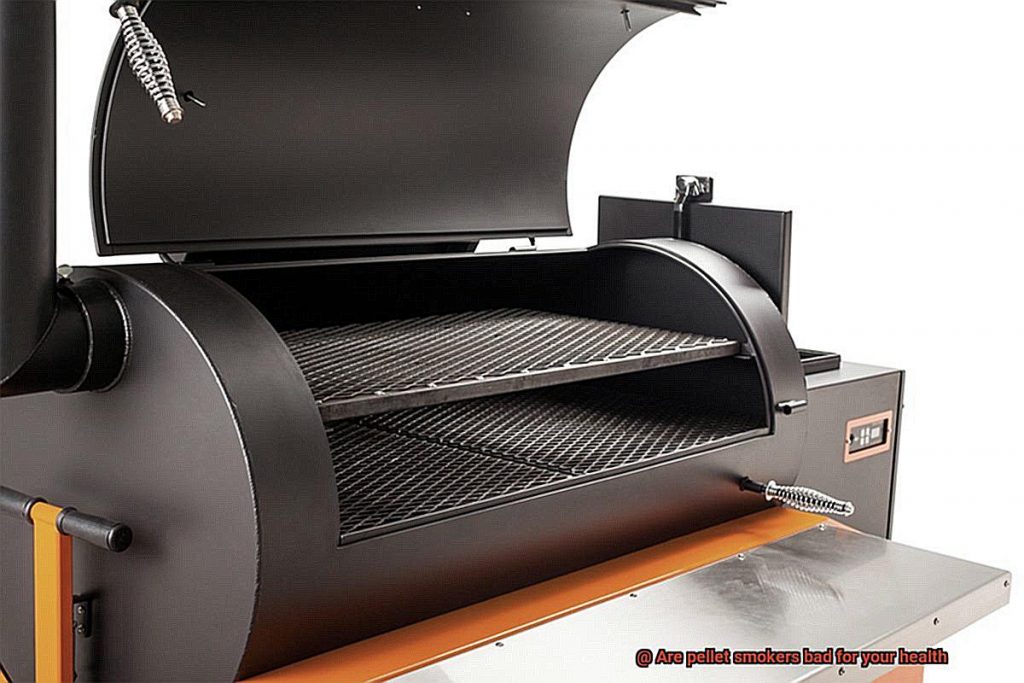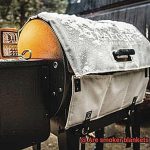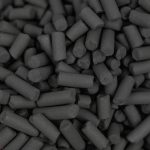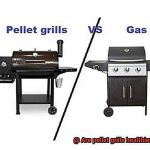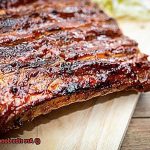Pellet smokers have become all the rage among grill aficionados in recent years. These high-tech cooking machines offer convenience and a mouthwatering smoky flavor that’s hard to resist.
But, like any newfangled gadget, concerns about their impact on our health have cropped up. So, let’s get to the meat of the matter: are pellet smokers bad for your health?
While these smokers come with a host of benefits, such as precise temperature control and ease of use, it’s crucial to consider the potential health risks they might pose. In this blog post, we’ll dive into the factors that could affect the healthiness of pellet smokers, giving you an informed perspective on this sizzling question.
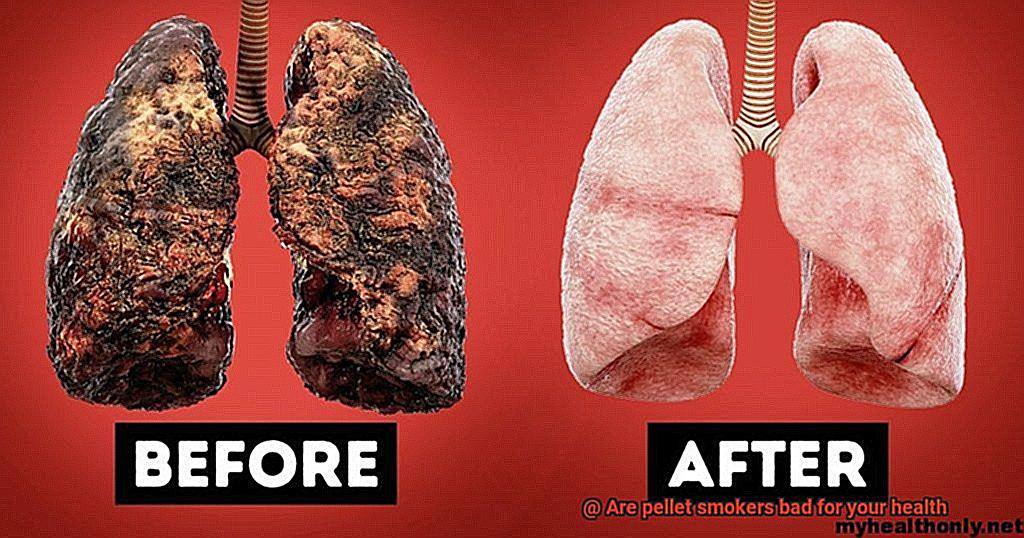
So grab your tongs and let’s dig into whether pellet smokers are friend or foe when it comes to our well-being.
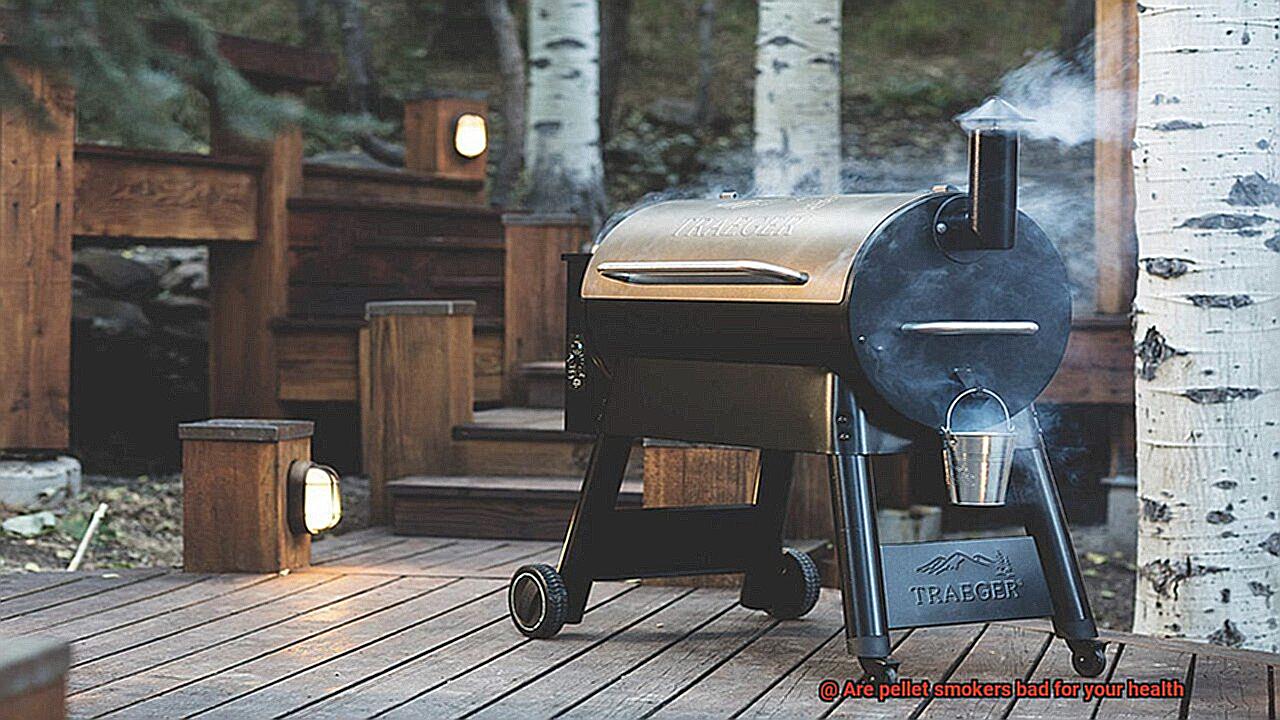
Contents
What are Pellet Smokers?
The marriage of the convenience found in gas grills with the tantalizing flavors of wood smokers has made pellet smokers a favorite among grillers looking to take their culinary skills to the next level. In this article, we will explore the world of pellet smokers, diving into their unique features, versatile capabilities, and important considerations for health-conscious grill masters.
The Marvels of Pellet Smokers:
Pellet smokers, also known as pellet grills, are outdoor cooking appliances that rely on wood pellets as their primary fuel source. These pellets, crafted from compressed sawdust and other wood byproducts, offer an authentic smoky flavor that ignites the taste buds. A hopper feeds the pellets into a fire pot using an auger system. An electric igniter then heats up the pellets, generating smoke that gracefully dances throughout the cooking chamber, infusing food with mouthwatering flavors.
Temperature Control and Versatility:
What sets pellet smokers apart is their unparalleled ability to maintain consistent temperatures throughout the cooking process. Unlike traditional grills or smokers that demand constant attention and adjustment, pellet smokers feature digital control panels that allow users to set and maintain precise cooking temperatures. This not only guarantees even cooking but also expands the possibilities in the culinary realm. From low and slow smoking to high-temperature grilling, roasting, baking, searing, and beyond, pellet smokers offer unmatched versatility that caters to every griller’s desires.
Health Considerations:
While some concerns have emerged regarding potential health risks associated with using pellet smokers, following certain precautions can minimize any potential harm. Opting for high-quality wood pellets made solely from pure hardwood without additives or fillers is crucial. These superior pellets burn cleaner, producing less ash and potential pollutants. Adequate ventilation during cooking, whether outdoors or in well-ventilated areas, helps reduce smoke concentration and exposure to harmful chemicals. Additionally, achieving that irresistible smoky flavor without excessive smoke production can be accomplished by cooking food at lower temperatures for longer periods.
Potential Health Risks of Using Pellet Smokers
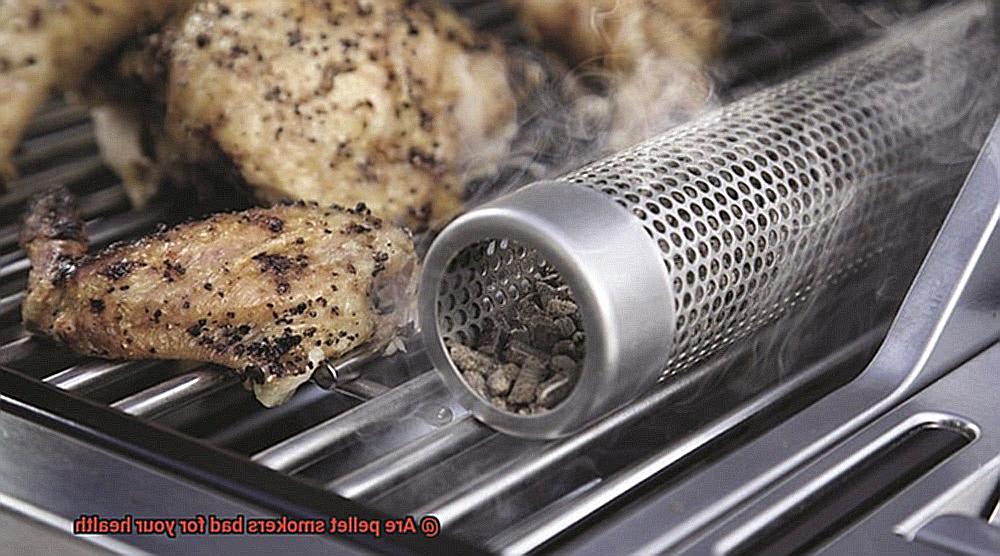
When it comes to firing up your pellet smoker for a mouthwatering barbecue feast, it’s important to be aware of the potential health risks that come along with it. Pellet smokers are known for their convenience and ability to provide consistent temperature control, but they also have some downsides that you should know about. Let’s dive into the world of smoky flavors and perfectly cooked meats while keeping an eye out for our well-being.
One of the main concerns with pellet smokers is the production of smoke and the release of harmful chemicals into the air. These smokers use wood pellets as fuel, which generate smoke when burned. Unfortunately, that smoke contains compounds like polycyclic aromatic hydrocarbons (PAHs) and volatile organic compounds (VOCs), both of which can be harmful if inhaled.
PAHs are formed when organic matter, such as wood, is burned at high temperatures. They have been linked to an increased risk of certain types of cancer, including lung, bladder, and skin cancer. Inhaling PAHs can also lead to respiratory issues and worsen existing conditions like asthma. So, while you’re trying to enjoy a relaxing cookout, you could unknowingly be exposing yourself to potential health problems.
VOCs, on the other hand, are sneaky chemicals that can vaporize into the air at room temperature. They can be found in various products and materials, including wood and charcoal. When released during the smoking process, they can contribute to poor indoor air quality and pose a risk to respiratory health. Imagine having headaches, dizziness, or irritation of the eyes and throat ruining your grilling experience – not exactly what you signed up for.
But wait, there’s more. Another potential health risk associated with pellet smokers is the formation of carbon monoxide (CO) gas. We all know that CO is no joke – it’s a colorless, odorless gas that can be deadly if inhaled in high concentrations. While pellet smokers generally produce lower levels of CO compared to traditional charcoal or wood smokers, it’s still crucial to ensure proper ventilation when using them to minimize the risk of CO poisoning.
Now that we’ve covered the potential health risks, let’s talk about how to mitigate them. Firstly, make sure your pellet smoker is placed in a well-ventilated area, preferably outdoors. This allows for the dispersion of smoke and other pollutants. Avoid using pellet smokers in enclosed spaces or near open windows and doors – you want that smoke to go far, far away.
Consider using natural hardwood pellets without added chemicals or binders. These may reduce the release of harmful compounds into the air. And don’t forget to regularly clean and maintain your smoker to minimize the buildup of ash and other residues that can affect air quality.
Factors that Affect Smoke Production and Chemical Levels
However, it’s essential to understand the factors that affect smoke production and chemical levels in pellet smokers to ensure both your health and the quality of your meals. In this blog post, we will explore the impact of wood pellets, temperature control, cooking time, additives, and ventilation on smoke production and chemical levels.
The Type of Wood Pellets:
Different types of wood pellets produce distinct flavors and aromas when burned. For example, mesquite pellets provide a bold smoky flavor, while applewood pellets offer a sweeter touch. However, certain wood pellets may contain higher levels of resin or sap, resulting in more smoke production and potentially increased levels of harmful chemicals. To prioritize safety, opt for natural hardwood pellets without additives for a cleaner, safer grilling experience.
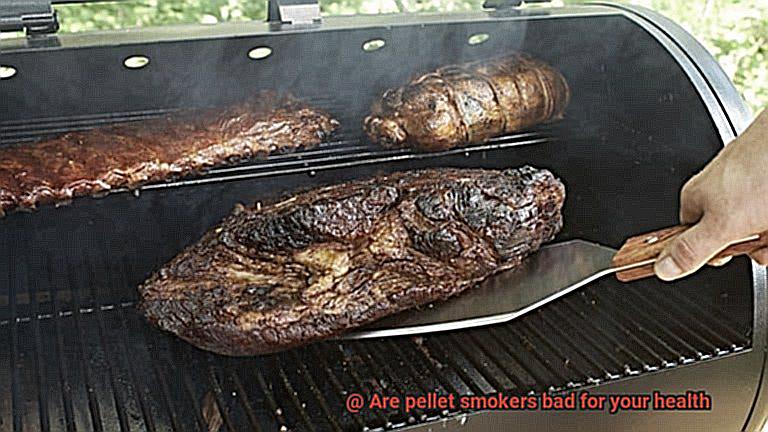
Temperature Control:
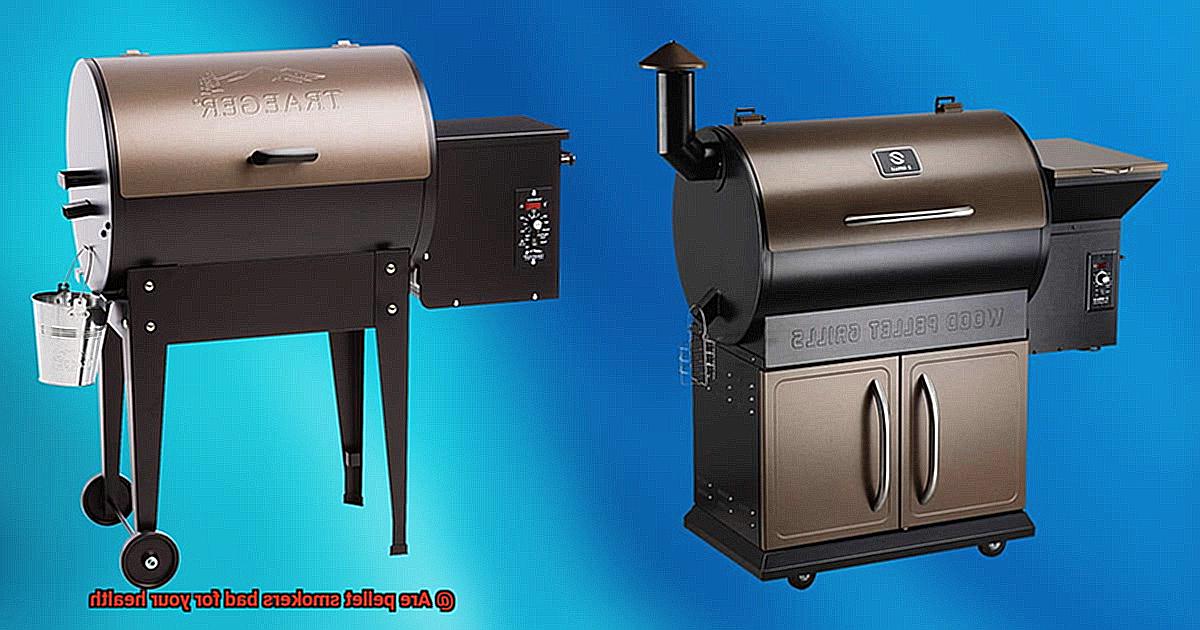
The art of smoke production lies in finding the perfect balance of temperature control. Higher temperatures burn pellets more completely, reducing smoke production but potentially increasing the release of harmful chemicals. On the other hand, lower temperatures can result in incomplete combustion and the release of more smoke and potentially harmful chemicals. Experiment with different temperature settings to achieve both optimum flavor and minimal health risks.
Cooking Time:
The duration of cooking time directly affects the amount of smoke generated and the potential inhalation of harmful chemicals. Longer cooking times allow for more smoke production, increasing the chances of inhaling potentially harmful chemicals. The concentration of these chemicals can vary based on factors such as wood type, temperature, and airflow within the smoker. Be mindful of cooking times to strike a balance between flavor enhancement and health implications.
Additives and Flavorings:
Some manufacturers add additional substances to enhance smoke flavor or aroma. While generally safe for consumption, it’s important to be aware of any potential allergic reactions or sensitivities to specific ingredients. Read ingredient labels carefully and choose products that align with your dietary needs and preferences.
Proper Ventilation:
Good airflow is crucial to reduce smoke concentration and potential chemical levels in the grilling area. Use a well-ventilated outdoor space and ensure there is proper ventilation around the smoker. Avoid direct exposure to smoke during grilling sessions to minimize any potential health risks associated with prolonged inhalation.
Minimizing the Potential Health Risks of Pellet Smokers
We don’t think so. But, as with anything in life, it’s essential to be aware of potential health risks, even when it comes to our beloved pellet smokers. Don’t worry though – we’ve got you covered. In this blog post, we’ll explore some common health risks associated with pellet smokers and share practical tips to minimize them. So, let’s fire up the grill and keep things safe and delicious.
Choosing Quality Pellets:
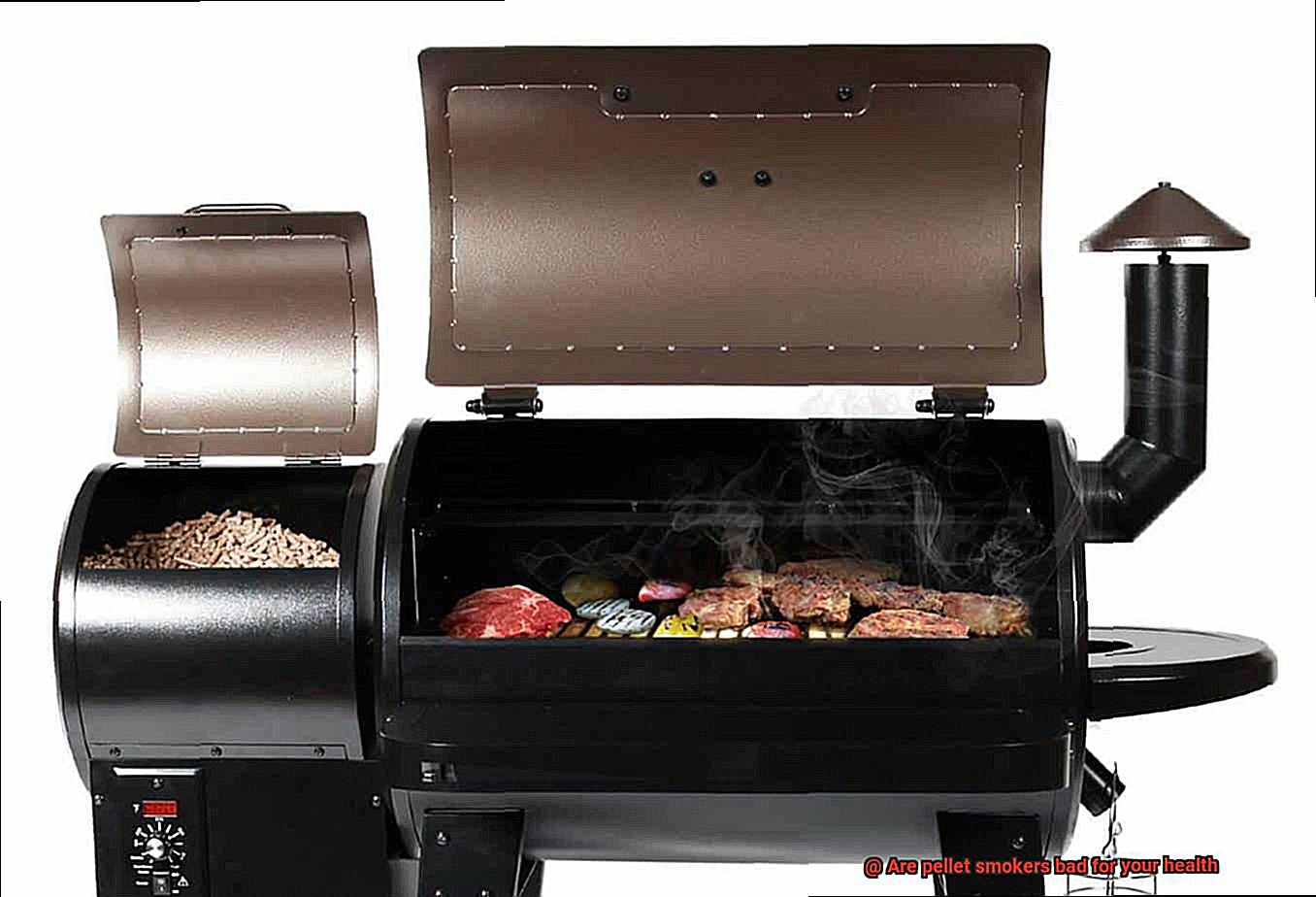
First things first – quality matters. Opt for high-quality pellets made from natural materials without any additives or fillers. Such pellets minimize the release of harmful chemicals during cooking, ensuring a cleaner and healthier grilling experience. Look for reputable brands that prioritize purity and sustainability.
Maintaining Cleanliness:
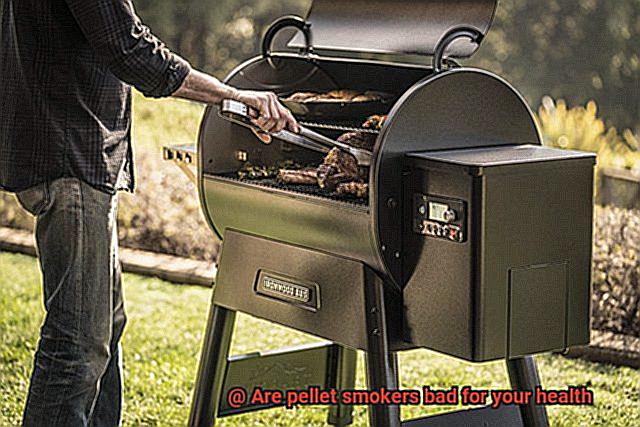
Keeping your pellet smoker clean is crucial for minimizing potential health risks. Regularly clean and maintain your smoker to prevent the buildup of grease and other potentially harmful substances. A clean smoker ensures optimal hygiene and enhances the overall grilling experience. Pro tip: Use a mixture of vinegar and water or a specialized cleaning solution to effectively tackle grease and residue.
Ventilation is Key:
Grill in a well-ventilated area to reduce exposure to smoke and fumes. Whether you’re grilling in your backyard or at a park, ensure there’s ample air circulation. Ventilation helps dissipate smoke and prevents it from lingering around your food, minimizing potential health risks.
Drip Trays and Foil:
To prevent drippings from coming into direct contact with the heat source, use a drip tray or line your grill grates with aluminum foil. This simple step can greatly reduce the production of harmful substances that can compromise your health.
Marinate for Protection:
Marinating your meats before grilling not only adds fantastic flavor but also helps reduce the formation of carcinogens. Citrus juices or vinegar-based marinades act as protective barriers against harmful compounds, making your grilled delights even healthier.
Don’t Overcook or Burn:
While we all love a good char on our meat, excessive charring or burning can increase the production of carcinogens. Cook your foods thoroughly, but avoid overcooking or burning them – strike that perfect balance for both taste and safety.
Grilled Food in Moderation:
As with any indulgence, moderation is key. Enjoy grilled foods as part of a balanced diet and lifestyle. Occasional grilling is unlikely to pose significant health risks, so fire up that grill and savor those delicious meals guilt-free.
Choosing High-Quality Wood Pellets
Let’s dive into the world of high-quality wood pellets – the unsung heroes of grilling. Choosing the right wood pellets is paramount for a healthier and tastier grilling experience. Here’s everything you need to know.
First and foremost, what distinguishes a high-quality wood pellet? Look for pellets made from pure hardwood, free from any additives or fillers. You want 100% natural pellets that are devoid of chemicals or binders. After all, who wants mysterious substances infiltrating their perfectly grilled steak?
To ensure you’re getting the crème de la crème, seek out wood pellets certified by esteemed organizations like the Pellet Fuels Institute or the Forest Stewardship Council. These certifications guarantee that the pellets meet rigorous quality standards and are sourced from sustainable forests. It’s not only good for your taste buds but also for the environment.
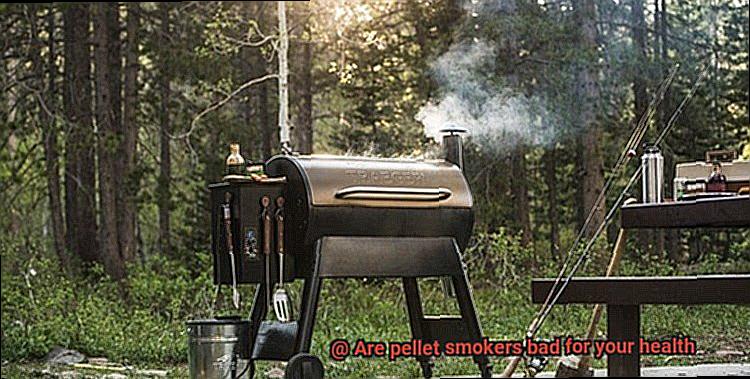
Moisture content is another vital factor to consider. High-quality pellets should have a moisture content ranging from 5-10%. Excessive moisture can lead to poor combustion and excessive smoke – a definite no-no. We’re aiming for that sweet spot of smoky flavor without going overboard.
Let’s talk flavors now. Different wood types impart distinct flavors to your food, so choose wisely. Whether you crave the subtle sweetness of apple or the robustness of hickory, there’s a wood type out there that will perfectly complement your culinary creations.
On the flip side, steer clear of low-quality or cheap wood pellets. They may contain fillers or additives that release harmful chemicals when burned – a potential health hazard that nobody wants on their plate.
To ensure you’re making the right choice, read reviews and seek recommendations from seasoned grillers or pellet smoker users. Their firsthand experiences can guide you in the right direction.
Remember, using high-quality wood pellets is only one piece of the puzzle. Employ proper grilling techniques, maintain cleanliness, and avoid overexposure to smoke and fumes for a truly healthy grilling experience.
Ensuring Proper Ventilation When Cooking
Grilling is an art that demands attention to detail, and one often overlooked aspect is proper ventilation. Regardless of the smoker you choose, ensuring adequate air circulation is vital for a safe and enjoyable cooking experience. In this article, we will emphasize the importance of proper ventilation when using a pellet smoker and provide practical tips to guarantee optimal air quality while grilling.
The Importance of Proper Ventilation:
- Enhanced Air Quality: Good ventilation eliminates smoke, gases, and other combustion byproducts from the cooking area. This ensures that you and your guests can breathe in clean air while savoring your grilled delicacies.
- Preventing Health Hazards: Insufficient ventilation can lead to the accumulation of harmful pollutants like carbon monoxide, posing serious health risks. Proper air circulation prevents these pollutants from building up, reducing potential hazards.
Ventilation Concerns with Pellet Smokers:
Pellet smokers, renowned for their controlled heat source and consistent temperature, still produce smoke during cooking. Although they generate less smoke than traditional charcoal or wood smokers, it remains crucial to ensure proper ventilation to avoid health risks.
Tips for Ensuring Adequate Air Circulation:
- Cook Outdoors or in Well-Ventilated Areas: Set up your pellet smoker on open spaces like patios or decks. Fresh outdoor air helps dissipate smoke and prevents it from lingering around you or your home.
- Utilize Exhaust Fans or Range Hoods: Install and use properly functioning exhaust fans or range hoods near your cooking area. These devices efficiently draw out smoke and odors, keeping your surroundings clean and fresh.
- Open Doors and Windows: When grilling, open doors and windows if possible to facilitate natural air circulation. This prevents smoke and odors from accumulating indoors.
- Avoid Cooking in Confined Spaces: Basements or small kitchens may lack proper ventilation, making them unsuitable for grilling. Choose a spacious area that allows for sufficient airflow.
- Consider Additional Fans or Air Purifiers: If you find ventilation in your cooking area insufficient, consider using additional fans or air purifiers to improve air circulation and eliminate any lingering smoke.
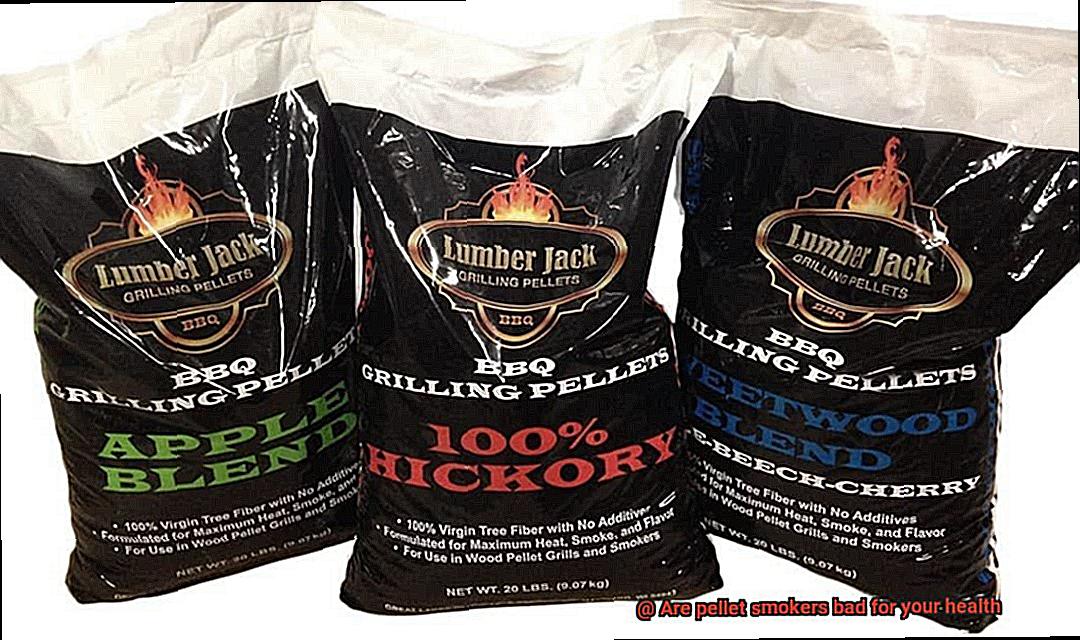
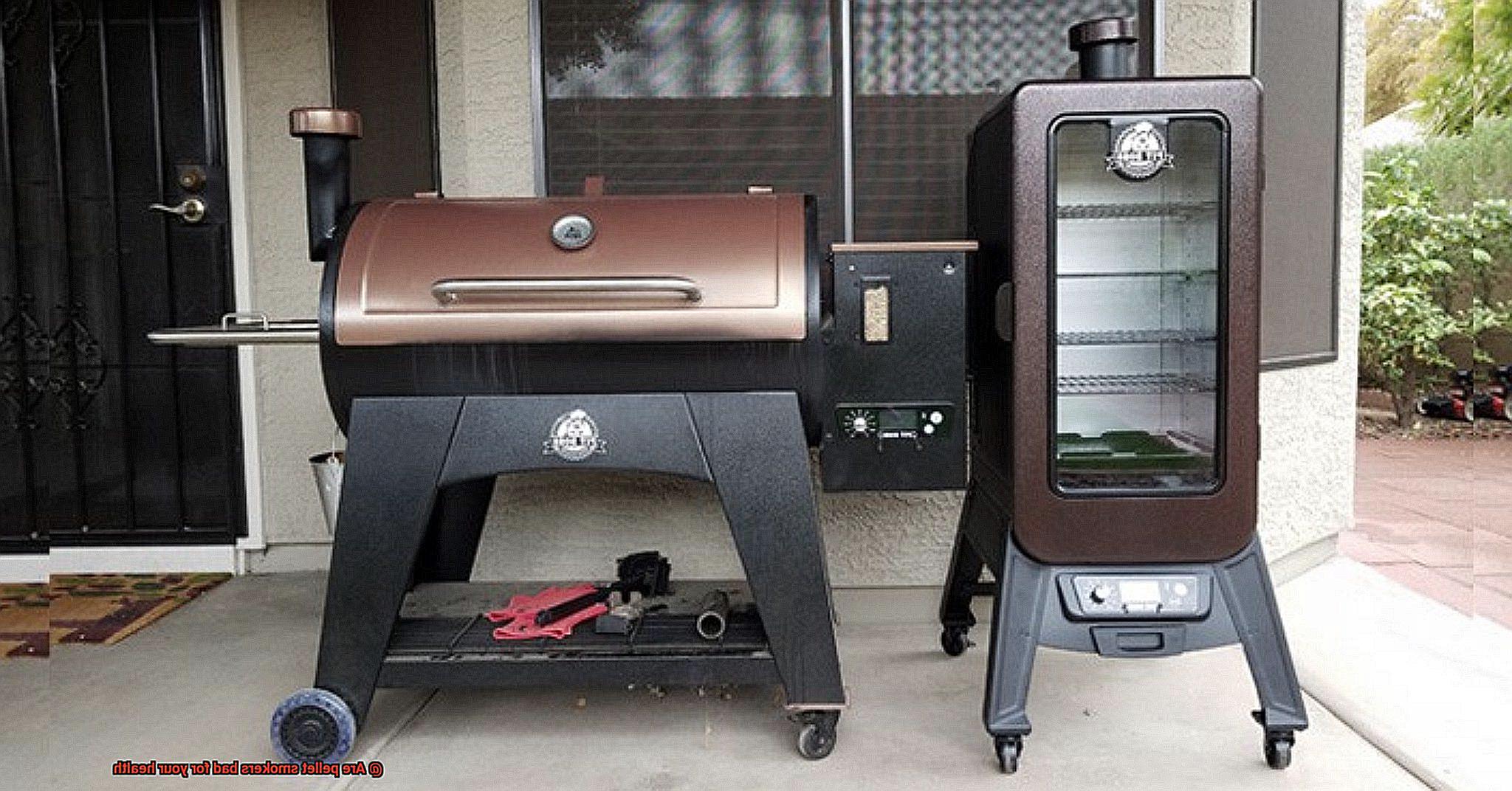
Safety Precautions:
Always follow the safety precautions recommended by the manufacturer of your pellet smoker. These may include guidelines for ventilation, such as maintaining a safe distance between the smoker and flammable materials, and ensuring proper clearance around the exhaust system.
Avoiding Charring and Burning Food
First and foremost, preheating your pellet smoker is crucial. This step ensures that your smoker reaches the desired temperature and prevents food from sticking to the grates, which can lead to charring. So fire it up and let it heat up properly before you start cooking.
Once your smoker is hot and ready, temperature control becomes key. Pellet smokers usually come with temperature control settings, so make sure you monitor and maintain the desired temperature throughout the cooking process. This will prevent excessive heat that can result in charring and burning.
To ensure your food is cooked to perfection without overcooking, invest in a meat thermometer. This essential tool allows you to accurately measure the internal temperature of your food. Overcooked food is more likely to become charred and burnt, so keep an eye on that thermometer.
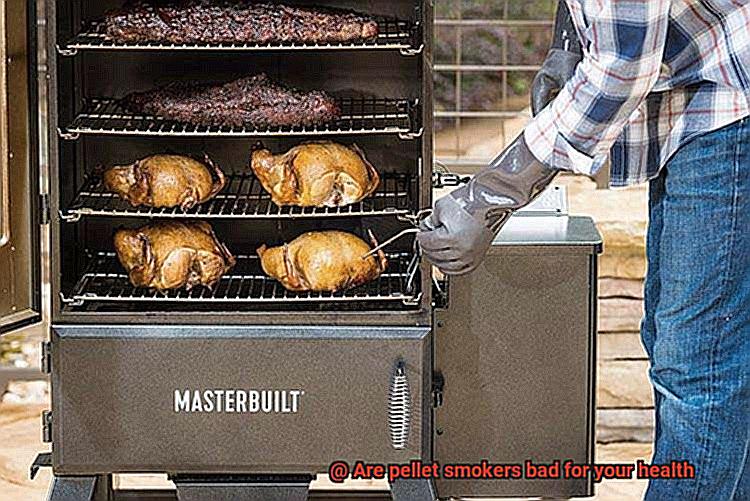
Now, let’s talk about lid etiquette. Avoid opening the lid of your pellet smoker frequently during cooking. Every time you do, heat escapes, causing temperature fluctuations that can lead to uneven cooking or charring. Keep that lid closed as much as possible to maintain a steady cooking environment.
Marinating or using a dry rub on meats before cooking can also help prevent charring. The marinade or rub creates a protective barrier on the surface of the meat, reducing direct contact with the heat source and minimizing the risk of charring.
Proper cooking techniques are crucial as well. Flip or rotate your food during the cooking process to ensure even heat distribution. This reduces the chances of one side of your food becoming overly charred.
By following these tips and techniques, you’ll be well on your way to avoiding charring and burning food when using your pellet smoker. Not only will your dishes taste better, but you’ll also promote healthier grilling practices by minimizing the formation of harmful compounds.
Practicing Good Food Hygiene
Whether you’re a seasoned grill master or just starting out, practicing good food hygiene is crucial to ensure mouthwatering dishes that are safe for consumption. In this guide, we will explore the secrets to maintaining cleanliness, preventing cross-contamination, proper food storage, cooking temperatures, and hand hygiene. Get ready to elevate your grilling game while keeping your health in check.
Cleanliness:
Before firing up your pellet smoker, give it a thorough scrub-down. Remove ashes, grease, and any remnants from previous cooking sessions. This simple step prevents harmful bacteria buildup and ensures a safe cooking environment. A clean smoker is the foundation of delicious and safe grilling.
Cross-Contamination Prevention:
Raw and cooked foods should never mingle. Separate cutting boards, utensils, and storage containers for raw meats, poultry, and seafood are essential. This precautionary measure prevents the spread of bacteria and keeps your dishes safe. Remember, each ingredient deserves its own space.
Proper Food Storage:
Storing food correctly is key to maintaining freshness and preventing bacterial growth. Perishable items like meat, dairy products, and leftovers should be stored in the refrigerator at or below 40°F (4°C). Wrap or cover them securely to protect against contamination. Don’t let food safety take a backseat during storage.
Cooking Temperatures:
Pellet smokers excel at low-temperature cooking for flavorful results. However, it’s crucial to ensure that the internal temperature of your food reaches a safe level. Use a meat thermometer to guarantee perfect doneness while eliminating harmful bacteria. Cook with precision for both taste and safety.
Hand Hygiene:
The power of clean hands cannot be underestimated. Before handling any ingredients, wash your hands thoroughly with soap and water for at least 20 seconds. This simple step eliminates potential bacteria transfer and sets the stage for a safe and enjoyable grilling experience. Clean hands, happy griller.
eqi0VAvfi9E” >
Conclusion
In conclusion, it is important to consider the potential health risks associated with pellet smokers. While they offer convenience and ease of use, the production of smoke and the burning of pellets can release harmful compounds into the air. These include polycyclic aromatic hydrocarbons (PAHs) and volatile organic compounds (VOCs), which have been linked to various respiratory issues and even cancer.
Furthermore, the use of wood pellets in these smokers can introduce additional concerns. Some manufacturers may treat their pellets with chemicals or additives that could pose health risks when ingested or inhaled.
However, it is worth noting that proper usage and maintenance of pellet smokers can help minimize these risks. Regular cleaning and ensuring adequate ventilation can go a long way in reducing exposure to harmful substances.
Ultimately, the decision to use a pellet smoker should be made with an understanding of the potential health implications. If you have pre-existing respiratory conditions or are particularly sensitive to smoke, it may be wise to explore alternative cooking methods.
Remember, your health should always be a top priority.

